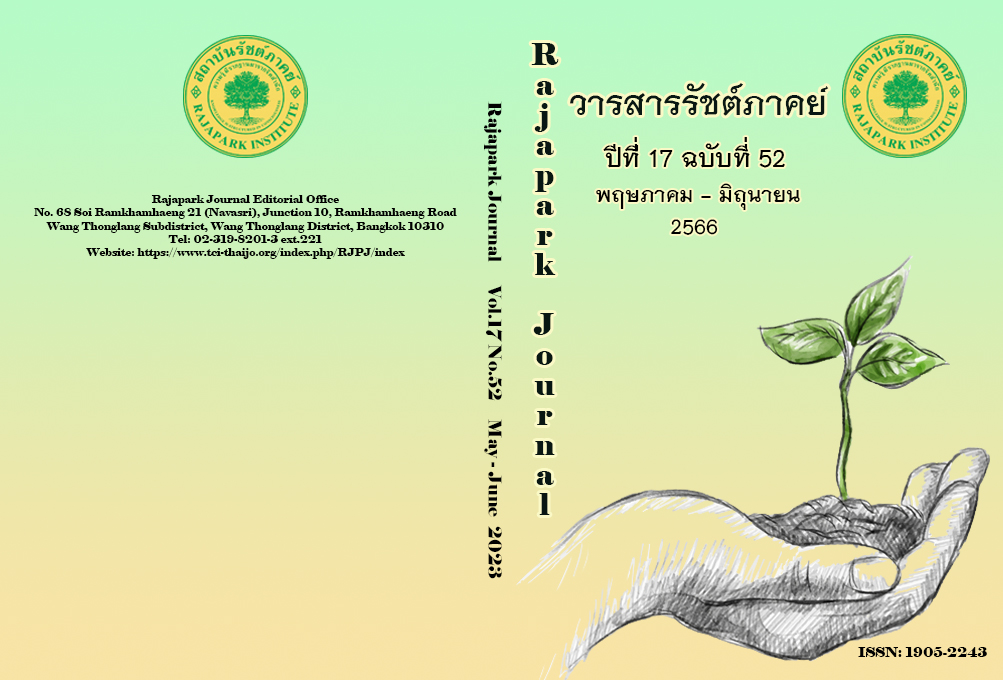Causal Factors that Influences Personal Retirement Planning of Private Company Employee in Thailand
Main Article Content
Abstract
The purposes of this research were 1) to study the factor that influence the personal retirement planning of private company employee in Thailand, 2) to study the influence of factor the personal retirement planning of private company employee in Thailand and 3) to create a causal factor model that influences the personal retirement planning of private company employees in Thailand. It is a mixed method of research (quantitative and qualitative) by collecting information using online questionnaires. Structural Equation Model (SEM) statistical analysis, which is one of the statistical techniques was used to test causal relationships. In-depth Interview was conducted with 5 informants, including executives and people involved in financial planning as experts to consider and help creating the research conceptual framework, concluding and reporting the results. The research results showed that factors of financial literacy have a direct positive influence on retirement behaviors and financial preparation. Financial literacy, retirement behaviors, and financial preparation have direct positive influences on retirement planning. Retirement planning has a direct positive influence on well-being. Financial literacy factors have an indirect influence on well-being. The model was consistent with the empirical data that had six harmonious indices that met the acceptant criteria: 2/df = 1.268 CFI = 1.00 GFI = 0.98 AGFI = 0.94 RMSEA = 0.026 and SRMR = 0.021
Article Details

This work is licensed under a Creative Commons Attribution-NonCommercial-NoDerivatives 4.0 International License.
Views and opinions appearing in the Journal it is the responsibility of the author of the article, and does not constitute the view and responsibility of the editorial team.
References
Angsuchoti, S. et al., (2011). Analytical Statistics for Social Science and Behavioral Science Research: LISREL Program Techniques (3rd ed.). Sukhothai Thammathirat Open University.
Davis, G. D., & Chen, Y. (2014). Age Differences in Demographic Predictors of Retirement Investment Decisions. https://doi.org/10.1080/03601270701838365.
Frank, M., & HanNa, L., (2021). Factors Associated with the Ownership of Individual Retirement Accounts (IRAs): Applying the Theory of Planned Behavior. Journal of Financial Counseling and Planning, 32(1), 116-130.
Herrador-Alcaide, T.C., Montserrat, H-S., & Topa, G. (2021). A Model for Personal Financial Planning Towards Retirement. Journal of Business Economics and Management, 22(2), 482-502. DOI:10.3846/jbem.2020.13978
Petchrot, L., & Chamniprasat, A. (2002). Research Methodology. Phim Dee Printing.
Ketkaew, C., Van Wouwe, M., Jorissen, A., Cassimon, D., Vichitthamaros, P., & Wongsaichia, S. (2022). Towards Sustainable Retirement Planning of Wageworkers in Thailand: A Qualitative Approach in Behavioral Segmentation and Financial Pain Point Identification. Risks 2022, 10(1), 8. https://doi.org/10.3390/risks10010008
Kumaraguru, L., & Geetha, C. (2021). Predicting Retirement Preparation Based on Proactivity, Time Discounting and Theory of Planned Behaviour (TPB). International Journal of Academic Research in Business and Social Sciences, 11(9), 1660-1680.
Philippas, N. D., & Avdoulas, C. (2019). Financial Literacy and Financial Well-being Among Generation-Z University Students: Evidence from Greece. The European Journal of Finance, 26(4-5), 360-381. DOI: 10.1080/1351847X.2019.1701512
Nakamura, J.S., Hong, J.H., Smith, J., Chopik, W.J., Chen, Y., Vander-Weele, T.J., & Kim, E.S. (2022). Associations Between Satisfaction with Aging and Health and Well-being Outcomes Among Older US Adults. JAMA Network Open, 5(2), e2147797. doi:10.1001/jamanetworkopen.2021.47797
Suksawang, P. (2014). Structural Equation Modelling. ISBN: 978-616-455-627-0
Praewpailin, J. (2021). The Role of Financial Literacy in Retirement Planning and Wealth Accumulation Among Self-employed Thai Workers. Journal of Population and Social Studies, 29, 177-194.
The Organisation for Economic Co-operation and Development. (2014). A Structural Equation Modelling Study of the Determinants of Retirement Preparedness. International Journal of Innovation, Creativity and Change, 11(6), 1-24.
U-on, V. (2011). Research and Business Information Discovery. Sripatum University.
Xiao, J. J., & Kumar, S. (2022). A Research Agenda on Consumer Financial Behavior. Edward Elgar.
Yamane, T. (1967). Statistics, An Introductory Analysis (2nd ed.). Harper and Row.
Yeh, Tsung-ming. (2020). An Empirical Study on How Financial Literacy Contributes to Preparation for Retirement. Journal of Pension Economics and Finance, 1-23. https://doi.org/10.1017/S1474747220000281
Zulaihati, S., Susanti, S., & Widyastuti, U. (2020). Teachers’ Financial Literacy: Does it Impact on Financial Behaviour?. Management Science Letters, 10, 653-658.


